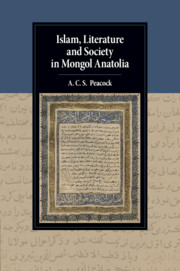Book contents
- Islam, Literature and Society in Mongol Anatolia
- Cambridge Studies in Islamic Civilization
- Islam, Literature and Society in Mongol Anatolia
- Copyright page
- Contents
- Illustrations
- Acknowledgements
- A Note on the Transliteration and Translation
- Abbreviations
- Introduction
- Part I Religion, Politics and Society
- Part II Literature and Religious Change
- 4 The Emergence of Literary Turkish
- 5 Vernacular Religious Literature
- 6 Apocalyptic Thought and the Political Elite
- Conclusion
- Bibliography
- Index
- Other Titles in the Series
- Plate Section (PDF Only)
5 - Vernacular Religious Literature
Tales of Conversion, Eschatology and Unbelief
from Part II - Literature and Religious Change
Published online by Cambridge University Press: 07 October 2019
- Islam, Literature and Society in Mongol Anatolia
- Cambridge Studies in Islamic Civilization
- Islam, Literature and Society in Mongol Anatolia
- Copyright page
- Contents
- Illustrations
- Acknowledgements
- A Note on the Transliteration and Translation
- Abbreviations
- Introduction
- Part I Religion, Politics and Society
- Part II Literature and Religious Change
- 4 The Emergence of Literary Turkish
- 5 Vernacular Religious Literature
- 6 Apocalyptic Thought and the Political Elite
- Conclusion
- Bibliography
- Index
- Other Titles in the Series
- Plate Section (PDF Only)
Summary
This chapter considers the new vernacular literature that circulated in the Mongol period, both Turkish works and those expressed in a simple accessible Persian aimed at a wide audience beyond the court. It shows how the concern with the battle against unbelief penetrated not just political but also increasingly religious discourse, as attested by this religious literature which is both evidence for and a product of the process of Islamisation. Concern with holy war (ghaza) were not limited to the Ottomans’ frontier with Byzantium, as is widely thought, but permeated works produced across Anatolia, including those written by Sufis. It thus argues against the widespread paradigm that sees Sufism as a more ‘Christian-friendly’ bridge to Islam.
- Type
- Chapter
- Information
- Islam, Literature and Society in Mongol Anatolia , pp. 188 - 217Publisher: Cambridge University PressPrint publication year: 2019

